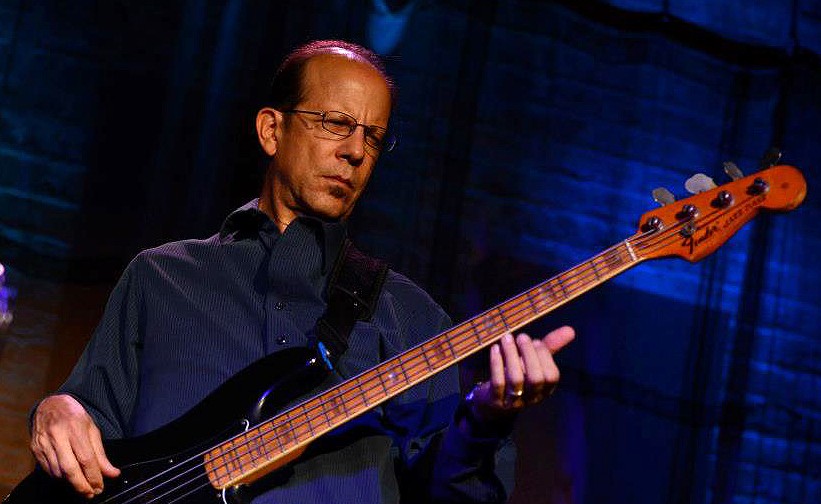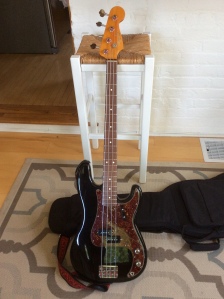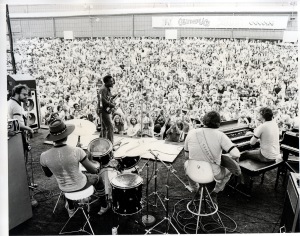I came across this recently. It’s an old article, but I’ve encountered this person’s editorializing before. http://racetraitor.org/blues.html (an interesting concept in itself) Go ahead and check it out. Did you? Are you back? Alright, then.
Things have changed in the last 20 years. The trend of white people playing blues, or something blues derived, has continued, in fact increased in spite of these sentiments, and the music has become increasingly rocked out, much like the changes that country music has undergone. These high energy versions of American music forms have become big business, as the consumer gets more of what he is offered by the corporations that control big radio and recording. While there are still people who pursue more traditional paths, maybe the larger audience just does not know it’s there.
This is a dated editorial. (1995). Maybe this is all irrelevant now. The battle has been lost, the barbarians have broken down the gates and sit in the ruins of the temple. Still, there it is, so apparently some people still find these arguments valid. One wonders why this is still on line. Some folks just never give up.
To begin presenting the (white blues critics) case against white people playing the blues (This was supposedly meant to be no more than a justification of an editorial policy. If so, why so much hostility?) , the author starts out by referencing an equally old article from the same site.
What follows is a brief history of the arguments of white critics like the founders of Living Blues magazine against white blues artists authenticity, and the opinion that white artists hurt the music and black performers livelihoods.
The author is one of the founders of Living Blues magazine, and the apparent go to guy when the editorial policy of the magazine is challenged, i.e. why they don’t cover white artists The position is that their focus is strictly on black culture. Right off the bat we are on thin ice here. We have white people who think that they are experts on black culture editorializing on the subject. And just a little hypocritical too, as the magazine has always taken advertising dollars from white artists. (Things have changed. LB now does reviews of white artists recordings. And the latest issue prominently mentions the passing of Johnny Winter, the “whitest” of the white. How unprincipled.) Not only that, but they can’t stick to the subject in their editorials without smearing white players as a group.
So the editorials are printed, and lo and behold, the backlash is more negative feedback from readers. This brings on more editorials.
Living Blues is not enough of a forum. So one of their associates has a piece published in Guitar Player (Now who reads Guitar Player, hmnn???! Perhaps guitar players? Including a lot of white guitar players?)
These critics seem to be taken aback when readers responses to these positions is negative. As if they don’t know that they are throwing red meat out there. Giving some people a pencil and a piece of paper is like giving a chimpanzee matches and dynamite. And so when 99% of the responses are negative, our man singles out a nut job as an example to support his case.
This kind of ignorance on the part of GP readers is apparently intolerable. So yet another editorial goes out and, amazing, the response is still negative! But we are having a ball, no? And we are a lot smarter than all of these people!
A couple of interesting statements:
1) “What many of the critics of magazine coverage are driving at is that they and their accomplices would like to receive coverage in Living Blues, principally because it is the pioneering magazine that covers black artists, i.e. “real” blues artists. They know, however, that they can’t raise this as an issue without revealing that they, too, believe that white blues are somehow inferior. In truth, the white artists receive considerable coverage in Blues Access,
principally because it is the pioneering magazine that covers black artists, i.e. “real” blues artists. They know, however, that they can’t raise this as an issue without revealing that they, too, believe that white blues are somehow inferior. In truth, the white artists receive considerable coverage in Blues Access, Blues Revue Quarterly,
Blues Revue Quarterly, and other magazines, but these magazines don’t carry the stamp of approval that Living Blues does, for strictly racial reasons.“
and other magazines, but these magazines don’t carry the stamp of approval that Living Blues does, for strictly racial reasons.“
Really? The “stamp of approval” from who, where? From other white experts of black culture? From yourself? And revelations of a musical inferiority complex! Thank you, Doctor. Is there a medication for that?
2) “Who are these people for whom race doesn’t matter? Not the average white blues artist. In fact, many white blues performers who, we are told, bring their own “authenticity” to their craft, display a mad craving for approval from black listeners and black artists, (not to mention black-oriented blues magazines like Living Blues ). Whenever the battle is enjoined, in person or in the letters and editorial columns of Living Blues,
). Whenever the battle is enjoined, in person or in the letters and editorial columns of Living Blues, Guitar Player,
Guitar Player, or Blues Revue Quarterly,
or Blues Revue Quarterly, a white blues performer writes a pseudo-palliative “brotherhood” letter and just happens to mention all the black artists with whom he’s performed, with the plain intention of proving that he must be acceptable or all of these obviously authentic artists wouldn’t have welcomed his company. In itself this attitude embodies the entire contradiction of the existence of white blues. If white blues is autonomous and self-authenticating, why is black approval needed? If it is not autonomous and self-authenticating, and the craving for black approval seems to suggest this, why is it not the weak and imitative form its detractors claim? This question remains with us. “
a white blues performer writes a pseudo-palliative “brotherhood” letter and just happens to mention all the black artists with whom he’s performed, with the plain intention of proving that he must be acceptable or all of these obviously authentic artists wouldn’t have welcomed his company. In itself this attitude embodies the entire contradiction of the existence of white blues. If white blues is autonomous and self-authenticating, why is black approval needed? If it is not autonomous and self-authenticating, and the craving for black approval seems to suggest this, why is it not the weak and imitative form its detractors claim? This question remains with us. “
And these poor critics are suffering from readers’ “vituperative abuse.”
This is a neat trap. Name any of the black artists you played with, and you reveal your “mad craving for approval from black listeners and black artists,” as well as your “plain intentions of proving” your acceptability. The blues does do strange things to some folks. I don’t disagree with the gentleman on everything. Its just the broad brush he and his cronies paint with. And the notion of white experts/protectors of black culture. I wonder, If musicians don’t really get it, how come writers do? So I’m exposed as an imitator and exploiter, dying inside for the approval of black artists and audiences, and he is a special white expert of black culture who has never met me, but knows my deep psychological desperation. Sheesh! You’ve got me. I admit it. I wanted to play with the black artists I was seeing. I wanted to play with anyone! And everyone was doing it (when everyone was not jumping off of a cliff). White guys playing with black artists. And, oh my goodness, black artists letting white guys play with them! I was lucky, even though I was catching the tail end. The classic sides had been recorded, and many of the artists were dead or not to be around forever. I not only got to sit in with people, but most of them were encouraging and welcoming. If you could play, they would let you sit in, even hire you. Didn’t they know that they were diluting the authenticity of their own music, while depriving black sidemen of a gig?
I doubt that my presence led artist X to “greater financial success.” I think he just liked the way I played his stuff. Or perhaps, horrors, he foolishly allowed me to hold him back by diluting the authenticity of his music!
The best thing that happened for me was meeting Artist Y (Isn’t this silly?), and helping him put together a band and the songs that he would perform for the rest of his career. We were two blacks and three whites. We all agree that we had the best times of our lives. And we recorded some good tracks, at least that’s what people tell me. Or maybe his honky sidemen are the reason he lost those two Grammys. Or maybe we should have exerted enough influence to put him over the top.
And we encountered race issues. The ones we had to negotiate amongst ourselves, and the more obvious ones. Like the motel clerks who would tell us they had no reservations for us. We started sending a white guy in to get the rooms.
If whitey stopped playing it, would whitey be willing to stop writing about it? I mean, doesn’t this take space away from black critics? Oh, I forgot, “Black music critics have bigger fish to fry, preferring to concentrate on rap and more popular artists.” There you have it. Maybe black writers don’t care about this aspect of black culture with the passion that white ones do. I might be virtually burned at the stake were I to make the outlandish suggestion that black musicians have bigger fish to fry and that leaves it to white artists to carry on the blues tradition.
I once posed this question to one of these geniuses. What if we all got out and let black people be in charge of the playing? And the criticism. And the record companies. And the clubs. And the whole scene. His response? “They’re not ready for that yet.”
Ouch! Freudian slip? Well meaning but paternalistic caretaker?
It’s not that I’m crazy about the state of the art. Hipster blues costuming is not something I’ve ever gone for, along with bizarre jive talk and over the top blues-rock guitar histrionics. I encounter countless students for who the frame of reference for blues is Stevie Ray Vaughn (along with his legions of mimics) and Eric Clapton. And there are a whole lot of annoying 12 year-old blues men shooting salvos of notes from their Stratocasters and singing about losing their babies. And (Jeez, Harlan, don’t say hordes) gaggles of Japanese blues artists and zealots, and Germans and Italians and Swedes and Argentinians and so on. And do I dare point out that you can walk into one of Chicago’s blues tourist traps and hear a kind of over the top funk blues, served up by black rhythm sections with drummers filling every hole and bassists slapping themselves silly? Or that there are high profile black performers whose blues has more than a little Jimi Hendrix/Stevie Ray in it? (Lord, I am getting into a world of trouble here. Have I stepped on the third rail yet?) I like to play blues the way I learned it. I also am still trying to unravel the mysteries of James Jamerson’s genius. Lately I’ve taken to trying to spend more time working on my reading skills (Is that a white thing? I know a black man who plays the piano. When I first met him, I asked, in my hippest and stupidest way possible, “So what kind of shit do you play?” He could barely suppress his amusement as he replied, “I’m a concert pianist!”).
As has been noted, the right to play is not an issue. For the critics, it’s an issue of purity. Well there ain’t no purity. More and more, it seems to be largely about being somebody. Being a blues big-shot. The blues the way we originally heard it is pretty much gone, but there’s some money to be made off of the word blues. Would people be less upset if they labeled thing correctly, like calling them blues-rock festivals, blues-rock societies and so on? Hey, we got a gig at a great derivative blues rock festival next month! Alright!
You know what? I’ve heard well played music from people of all colors. I’ve also witnessed a broad rainbow of cartoonish blues butchery.
I like a lot of Southern Soul. Now, do you think that Steve Cropper and Duck Dunn “diluted” the Stax sound? That Tommy Cogbill’s lifeless bass work caused those James Carr and Aretha Franklin tracks to be “inferior?”? That the Swampers in Muscle Shoals produced music that is “deeply impoverished?” Did Charley Pride sing country music well? Should Fats Domino have recorded that Hank Williams song? Modern Sounds in Country and Western Music is considered by some to be Ray Charles’ best work. Naysayers discouraged him from recording it, but he knew he had a good idea. Musicians just don’t know what they should be playing, do they? If they would only listen to critics…
Maybe it is all whitey’s fault. For opening up blues clubs and bringing out the music from the neighborhoods it was played in, for producing records, forming blues societies, festivals, blues competitions, publishing magazines (!) etc. Alan Lomax ought to shoulder a lot of the responsibility. And let’s heap some blame on the Beatles, Stones and all of those Brits for making us all want to be musicians. And what do musicians do? Well, they play what they hear, especially what catches their fancy. Musician hear, musician do. Writer write. One could consider whether the blues and its creators would be better off today untouched by white control of everything economic and commercial (which includes Grammys). Would it still be the same blues?
Some of my history and opinions on these things can be read in an interview I did for Michael Limnios: http://blues.gr/profiles/blogs/bassist-harlan-lee-terson-talks-about-lonnie-brooks-otis-rush
For a more insightful study, check out this thesis by a German student of the subject, Ulrich Adelt. It’s long, but he’s a lot more articulate than I am, and unlike me he has no skin, so to speak, in the game. http://ir.uiowa.edu/cgi/viewcontent.cgi?article=1313&context=etd
And for a black performer’s take on such matters, (the late) Chick Willis speaks: http://www.bluestrust.com/Blues%20Trust/chicks_rant.htm
And don’t forget to have a nice day.


